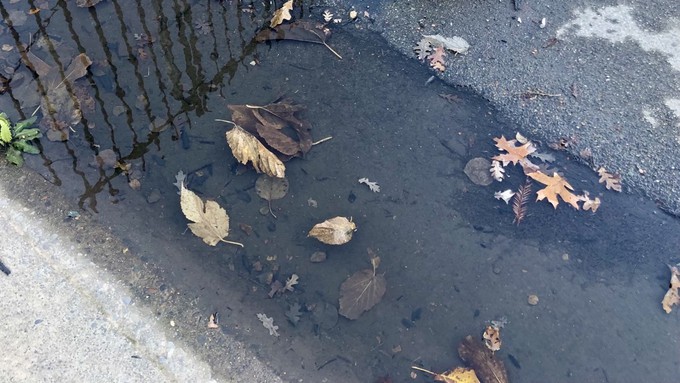
Sacramento expects 2.3 inches of rain (or more) in the next three days

The gutters don’t unclog themselves! Avoid creating street ponds by making sure gutters and storm drains are clear before the rain starts. Check downspouts around the house, too. Kathy Morrison
According to the National Weather Service, Sacramento will get a one-two punch this weekend from a pair of major storm systems. The first arrives Friday evening and will soak Saturday events. The second – and the heaviest – starts Sunday night with rain expected to continue through Wednesday.
These twin atmospheric rivers are expected to drop about 2.3 inches of rain in the next three days in downtown Sacramento – and more in the foothills. So, plan accordingly.
* If you haven’t already, turn off sprinklers and other irrigation. Everything should get a deep soaking from these storms.
* It may be too much water for some plants – especially succulents. If possible, move succulents growing in containers to someplace under cover so their pots (and roots) don’t become waterlogged.
* Make sure gutters and storm drains are clear of leaves and other debris.
* Be careful walking on wet soil; it can compact easily – squeezing out any air. Microbes (and roots) need those underground air pockets to survive.
* January is the time to apply horticultural oils on fruit trees (especially copper spray on peaches), but put off that chore for at least a week. It’s too wet for those anti-fungal sprays to be effective.
* Don’t dig in the garden this next week – it’s too wet and risks soil compaction. Any planting can wait until these storms pass. Right now, all that water could rot their roots.
* Got bare-root roses or other plants waiting to go in the ground? Pot them up in large black plastic pots with potting soil. Then, transplant them – soil and all – into the garden in March. They’ll benefit from this head start.
* Watch out for leaning trees. All this moisture can destabilize their roots. If you see trouble, call an arborist – before the tree falls.
Comments
0 comments have been posted.Sacramento Digs Gardening to your inbox.
Sites We Like
Garden Checklist for week of May 5
Survey your garden after the May 4 rainstorm. Heavy rain and gusty winds can break the neck of large flowers such as roses. Also:
* Keep an eye on new transplants or seedlings; they could take a pounding from the rain.
* Watch out for powdery mildew. Warmth following moist conditions can cause this fungal disease to “bloom,” too. If you see a leaf that looks like it’s dusted with powdered sugar, snip it off.
* After the storm, start setting out tomato transplants, but wait on the peppers and eggplants (they want warmer nights). Pinch off any flowers on new transplants to make them concentrate on establishing roots instead of setting premature fruit.
* Trim dead flowers but not leaves from spring-flowering bulbs such as daffodils and tulips. Those leaves gather energy to create next year's flowers. Also, give the bulbs a fertilizer boost after bloom.
* Pinch chrysanthemums back to 12 inches for fall flowers. Cut old stems to the ground.
* Mulch around plants to conserve moisture and control weeds.
* From seed, plant beans, beets, cantaloupes, carrots, corn, cucumbers, melons, pumpkins, radishes and squash.
* Plant onion sets.
* In the flower garden, plant seeds for asters, cosmos, celosia, marigolds, salvia, sunflowers and zinnias. Transplant petunias, zinnias, geraniums and other summer bloomers.
* Plant perennials and dahlia tubers for summer bloom.
* Don’t wait; plant summer bulbs, such as gladiolus and tuberous begonias.
* Harvest cabbage, lettuce, peas and green onions.